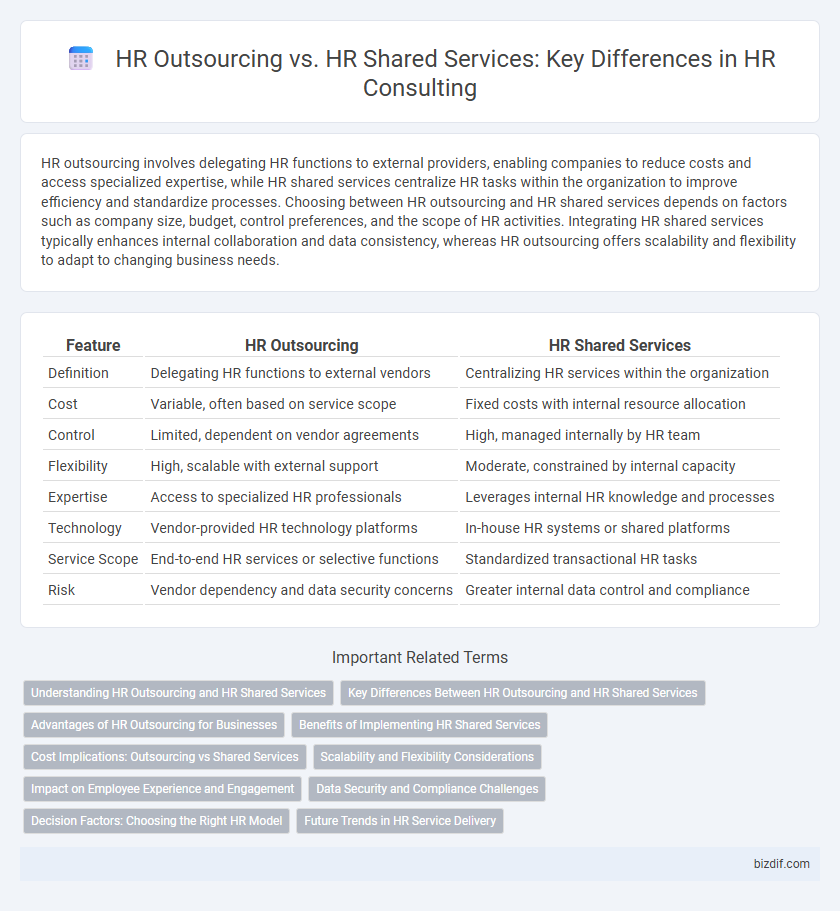HR outsourcing involves delegating HR functions to external providers, enabling companies to reduce costs and access specialized expertise, while HR shared services centralize HR tasks within the organization to improve efficiency and standardize processes. Choosing between HR outsourcing and HR shared services depends on factors such as company size, budget, control preferences, and the scope of HR activities. Integrating HR shared services typically enhances internal collaboration and data consistency, whereas HR outsourcing offers scalability and flexibility to adapt to changing business needs.
Table of Comparison
| Feature | HR Outsourcing | HR Shared Services |
|---|---|---|
| Definition | Delegating HR functions to external vendors | Centralizing HR services within the organization |
| Cost | Variable, often based on service scope | Fixed costs with internal resource allocation |
| Control | Limited, dependent on vendor agreements | High, managed internally by HR team |
| Flexibility | High, scalable with external support | Moderate, constrained by internal capacity |
| Expertise | Access to specialized HR professionals | Leverages internal HR knowledge and processes |
| Technology | Vendor-provided HR technology platforms | In-house HR systems or shared platforms |
| Service Scope | End-to-end HR services or selective functions | Standardized transactional HR tasks |
| Risk | Vendor dependency and data security concerns | Greater internal data control and compliance |
Understanding HR Outsourcing and HR Shared Services
HR Outsourcing involves delegating specific HR functions such as payroll, recruitment, and benefits administration to third-party providers to reduce costs and enhance efficiency. HR Shared Services centralize HR activities within an organization, creating a unified service center that manages employee inquiries and transactional tasks to improve service delivery and consistency. Understanding the distinctions between HR Outsourcing and HR Shared Services helps organizations optimize their HR strategy by balancing cost savings with control and customization.
Key Differences Between HR Outsourcing and HR Shared Services
HR outsourcing involves delegating HR functions such as payroll, recruitment, and compliance to external vendors, enabling organizations to reduce costs and access specialized expertise. In contrast, HR shared services consolidate internal HR operations into a centralized unit serving multiple business units, enhancing efficiency and consistency across the company. The key differences lie in control, with outsourcing relying on third-party providers and shared services maintaining internal management, and in scalability, where outsourcing offers flexible service levels, while shared services focus on process standardization within the organization.
Advantages of HR Outsourcing for Businesses
HR outsourcing enables businesses to reduce operational costs by leveraging external expertise for payroll, benefits administration, and compliance management, enhancing efficiency and minimizing risks. It allows access to specialized HR technologies and industry best practices without the need for significant internal investment, improving scalability and flexibility. Outsourcing HR functions also frees internal resources to focus on strategic initiatives, fostering innovation and driving core business growth.
Benefits of Implementing HR Shared Services
Implementing HR Shared Services streamlines HR processes by centralizing functions such as payroll, recruitment, and benefits administration, leading to increased operational efficiency and cost savings. This approach enhances service consistency and employee experience through standardized workflows and dedicated HR support teams. Organizations benefit from improved data accuracy, quicker response times, and the flexibility to scale HR operations in alignment with business growth.
Cost Implications: Outsourcing vs Shared Services
HR outsourcing typically reduces costs by converting fixed expenses into variable costs, leveraging external expertise, and minimizing infrastructure investments. In contrast, HR shared services demand upfront capital for technology and process standardization but yield long-term savings through streamlined operations and internal resource optimization. Organizations must assess scale, complexity, and control preferences to determine the most cost-effective HR service delivery model.
Scalability and Flexibility Considerations
HR outsourcing offers significant scalability by enabling companies to rapidly adjust workforce management resources without the need for extensive internal infrastructure changes. In contrast, HR shared services typically provide greater flexibility within existing organizational processes, allowing for streamlined HR functions centralized in-house. Decision makers prioritize scalability in HR outsourcing when anticipating fluctuating demands, while shared services are preferred for maintaining consistent control and customization of HR operations.
Impact on Employee Experience and Engagement
HR Outsourcing often leads to standardized processes that reduce personalized support, potentially diminishing employee experience and engagement due to less direct interaction with internal HR teams. In contrast, HR Shared Services maintain closer alignment with company culture by centralizing functions internally, enhancing responsiveness and fostering stronger employee connections. Data from Deloitte indicates organizations using HR Shared Services report 20% higher employee satisfaction scores compared to those relying primarily on outsourced HR solutions.
Data Security and Compliance Challenges
HR outsourcing often involves third-party vendors handling sensitive employee data, increasing risks of data breaches and compliance lapses under regulations like GDPR and HIPAA. In contrast, HR shared services maintain data processing within the organization, enhancing control over data security protocols and regulatory adherence. Choosing between these models requires careful evaluation of the organization's ability to manage compliance frameworks and safeguard confidential HR information effectively.
Decision Factors: Choosing the Right HR Model
Choosing between HR outsourcing and HR shared services hinges on factors such as cost efficiency, scalability, and control over HR functions. HR outsourcing offers access to specialized expertise and flexible resource allocation, ideal for businesses seeking to reduce internal HR overhead. HR shared services provide centralized processes within the organization, enhancing consistency, data security, and direct oversight, making it suitable for companies prioritizing internal alignment and customization.
Future Trends in HR Service Delivery
HR Outsourcing is evolving with AI-driven platforms and automation tools that enhance efficiency and reduce costs, while HR Shared Services are increasingly integrating cloud-based solutions to provide scalable, customizable employee support. The future landscape of HR service delivery emphasizes hybrid models combining external expertise with in-house capabilities, leveraging advanced analytics for predictive insights and personalized employee experiences. Organizations adopting these trends benefit from improved workforce agility, strategic talent management, and seamless service continuity across global operations.
HR Outsourcing vs HR Shared Services Infographic

 bizdif.com
bizdif.com